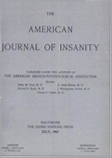THE PROGNOSIS OF INVOLUTION MELANCHOLIA
Abstract
We may state the following as the result of our work: The results in a series of sixty-seven patients in whom the final outcome was determined in all but one case, cause us to conclude that patients with involution melancholia recover unless they show as dominant symptoms: marked insufficiency of affect, peevish or auto-erotic behavior, or ridiculous hypochondriac delusions which usually are concerned with the alimentary tract. These prognostically bad symptoms may be present for a short phase of the psychosis in women at the menopause without their prejudicing the outlook for recovery. All patients who eventually recover show some improvement within four years after the onset. The others run a chronic course or die unimproved.
Access content
To read the fulltext, please use one of the options below to sign in or purchase access.- Personal login
- Institutional Login
- Sign in via OpenAthens
- Register for access
-
Please login/register if you wish to pair your device and check access availability.
Not a subscriber?
PsychiatryOnline subscription options offer access to the DSM-5 library, books, journals, CME, and patient resources. This all-in-one virtual library provides psychiatrists and mental health professionals with key resources for diagnosis, treatment, research, and professional development.
Need more help? PsychiatryOnline Customer Service may be reached by emailing [email protected] or by calling 800-368-5777 (in the U.S.) or 703-907-7322 (outside the U.S.).



